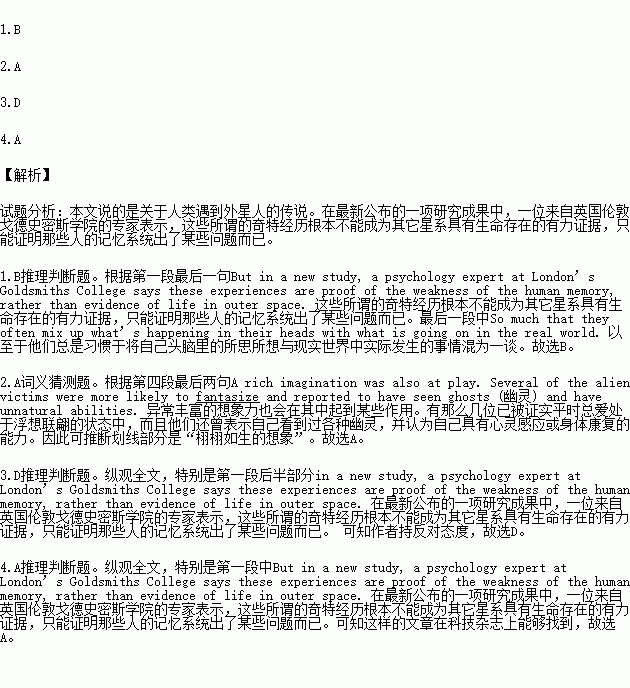题目内容
Do you have memories of being kidnapped (绑架)by aliens (外星人) and taken away rapidly in a spaceship? You wouldn’t be alone. Several thousand people worldwide reported to have had such experiences, researchers say. But in a new study, a psychology expert at London’s Goldsmiths College says these experiences are proof of the weakness of the human memory, rather than evidence of life in outer space.
“Maybe what we’re dealing with here is false memories, and not that people are actually being kidnapped and taken aboard spaceships,” says Professor Chris French, who surveyed 19 so-called victims.
Several of the victims reported being taken away from their beds or cars by alien creatures around four feet high, with long and lean arms and legs and oversized heads, French said. Some men said they were forced to take painful medical examinations by the aliens.
Many of the alien experiences could be explained by sleep paralysis, a condition in which a person is awake and aware of the surroundings but is unable to move. Sleep paralysis often leads to hallucinations —the experience of seeing or feeling something that is not really there and 40 percent of people experience the state at least once in their lives, French said. A rich imagination was also at play. Several of the alien victims were more likely to fantasize and reported to have seen ghosts (幽灵) and have unnatural abilities.
“People have very rich fantasy lives,” said French, who is due to present his findings at a public seminar at London’s Science Museum on Wednesday. “So much that they often mix up what’s happening in their heads with what is going on in the real world.”
1.According to Chris French, if someone told you an alien experience again, you might _____.
A. believe the story B. just laugh it away
C. wonder why D. report it to the police
2.The underlined word “fantasize” in Paragraph 4 probably means _____.
A. use vivid imagination B. tell the truth
C. have good memories D. make up excuses
3.What is the author’s attitude towards alien experiences?
A. Puzzling. B. Supportive.
C. Respectful. D. Objective.
4.Where can this passage probably be found?
A. A science magazine. B. A textbook.
C. A science fiction. D. A storybook.
 名校课堂系列答案
名校课堂系列答案
